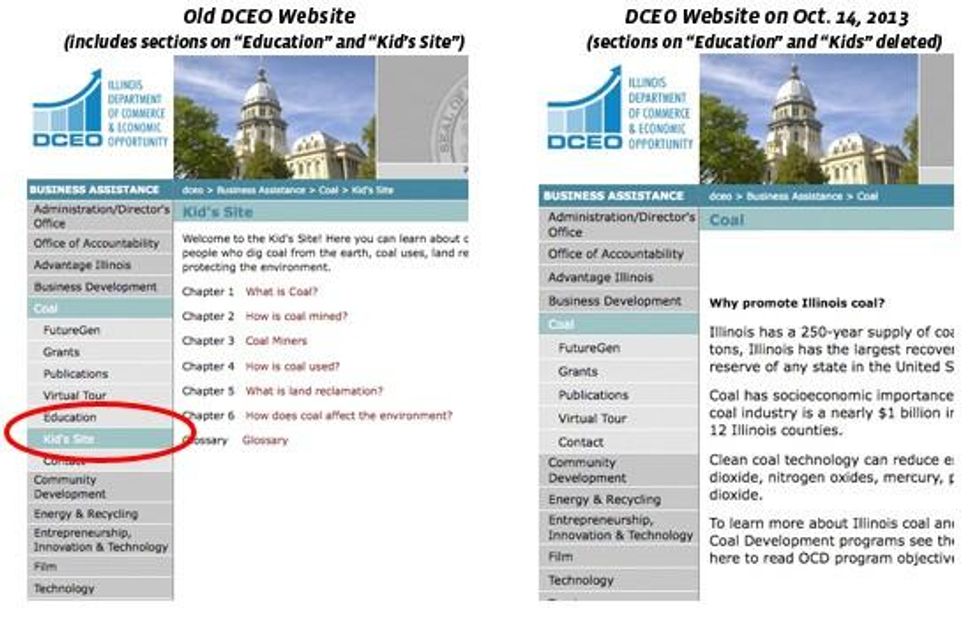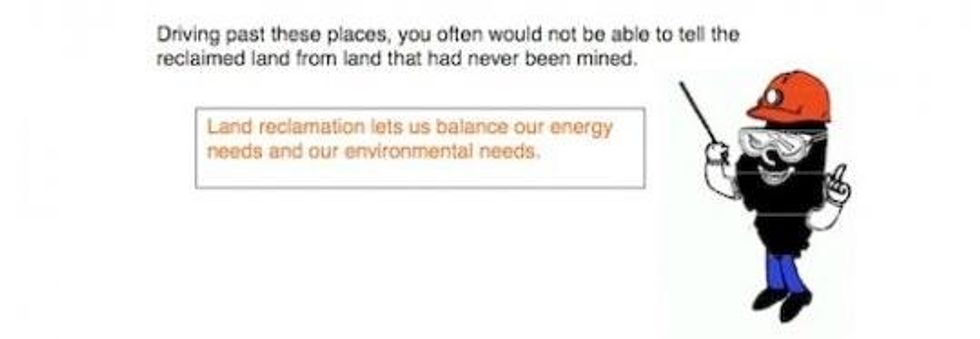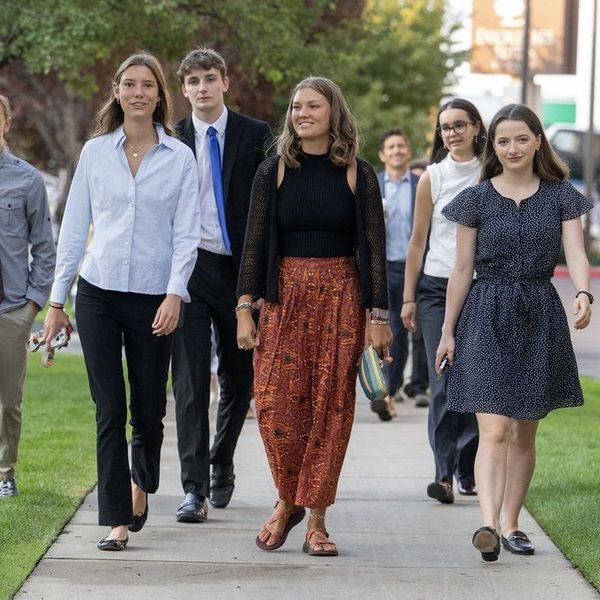Pro-Coal Kids' Pages Pulled from Government Site as Public Pressure Increases
Two sections that essentially told kids that coal was safe and good for the environment disappeared today from the website of a state agency in Illinois.

The website sections were supposed to educate children about energy, but had been widely denounced because they focused on misleading pro-coal messages.
It wasn't just environmentalists who objected to the way Illinois was talking about coal to kids. Last month, a state-commissioned evaluation of the Illinois coal education program determined that the curriculum, including the website, was "biased towards a positive image of coal."
As pressure increased on the department to take action, staff members initially claimed that they were too broke to fix the problem. Then the pages disappeared from the site on Monday. Earlier screen shots show sections called "Education" and "Kid's Site," neither of which was visible when YES! checked the DCEO site today. (See image above.)
"This is a victory for our children and schools," said Sam Stearns, a former coal miner who helped to organize for the site to be changed, "and a first step toward refashioning an energy education program that tells the truth about the health and environmental impacts of coal mining and burning."
In the CREDO petition Stearns launched, along with former country music singer and environmentalist Mark Donham, the two criticized the website's downplay of environmental impacts and safety issues among miners, especially black lung disease.
They also singled out the use of a cartoon figure that told children that land reclamation efforts after strip-mining return the land "the way it was or better than before mining."

"It's not surprising that a desperate industry would try and win children's hearts and minds," said Josh Golin, the campaign's associate director. "But it's beyond disappointing that state education officials would help dirty coal with this dirty mission."
Bill Bigelow, curriculum editor at Rethinking Schools magazine and co-director of the Zinn Education Project, found the outcome encouraging.
"They can only get away with this because people haven't demanded that it stop," he said. "Now, they have."
Jeff Biggers wrote this article for YES! Magazine, a national, nonprofit media organization that fuses powerful ideas and practical actions. Winner of the David R. Brower Award for Environmental Reporting, Jeff is the author of Reckoning at Eagle Creek: The Secret Legacy of Coal in the Heartland, among other books. His website is www.jeffbiggers.com.
An Urgent Message From Our Co-Founder
Dear Common Dreams reader, The U.S. is on a fast track to authoritarianism like nothing I've ever seen. Meanwhile, corporate news outlets are utterly capitulating to Trump, twisting their coverage to avoid drawing his ire while lining up to stuff cash in his pockets. That's why I believe that Common Dreams is doing the best and most consequential reporting that we've ever done. Our small but mighty team is a progressive reporting powerhouse, covering the news every day that the corporate media never will. Our mission has always been simple: To inform. To inspire. And to ignite change for the common good. Now here's the key piece that I want all our readers to understand: None of this would be possible without your financial support. That's not just some fundraising cliche. It's the absolute and literal truth. We don't accept corporate advertising and never will. We don't have a paywall because we don't think people should be blocked from critical news based on their ability to pay. Everything we do is funded by the donations of readers like you. Will you donate now to help power the nonprofit, independent reporting of Common Dreams? Thank you for being a vital member of our community. Together, we can keep independent journalism alive when it’s needed most. - Craig Brown, Co-founder |

The website sections were supposed to educate children about energy, but had been widely denounced because they focused on misleading pro-coal messages.
It wasn't just environmentalists who objected to the way Illinois was talking about coal to kids. Last month, a state-commissioned evaluation of the Illinois coal education program determined that the curriculum, including the website, was "biased towards a positive image of coal."
As pressure increased on the department to take action, staff members initially claimed that they were too broke to fix the problem. Then the pages disappeared from the site on Monday. Earlier screen shots show sections called "Education" and "Kid's Site," neither of which was visible when YES! checked the DCEO site today. (See image above.)
"This is a victory for our children and schools," said Sam Stearns, a former coal miner who helped to organize for the site to be changed, "and a first step toward refashioning an energy education program that tells the truth about the health and environmental impacts of coal mining and burning."
In the CREDO petition Stearns launched, along with former country music singer and environmentalist Mark Donham, the two criticized the website's downplay of environmental impacts and safety issues among miners, especially black lung disease.
They also singled out the use of a cartoon figure that told children that land reclamation efforts after strip-mining return the land "the way it was or better than before mining."

"It's not surprising that a desperate industry would try and win children's hearts and minds," said Josh Golin, the campaign's associate director. "But it's beyond disappointing that state education officials would help dirty coal with this dirty mission."
Bill Bigelow, curriculum editor at Rethinking Schools magazine and co-director of the Zinn Education Project, found the outcome encouraging.
"They can only get away with this because people haven't demanded that it stop," he said. "Now, they have."
Jeff Biggers wrote this article for YES! Magazine, a national, nonprofit media organization that fuses powerful ideas and practical actions. Winner of the David R. Brower Award for Environmental Reporting, Jeff is the author of Reckoning at Eagle Creek: The Secret Legacy of Coal in the Heartland, among other books. His website is www.jeffbiggers.com.

The website sections were supposed to educate children about energy, but had been widely denounced because they focused on misleading pro-coal messages.
It wasn't just environmentalists who objected to the way Illinois was talking about coal to kids. Last month, a state-commissioned evaluation of the Illinois coal education program determined that the curriculum, including the website, was "biased towards a positive image of coal."
As pressure increased on the department to take action, staff members initially claimed that they were too broke to fix the problem. Then the pages disappeared from the site on Monday. Earlier screen shots show sections called "Education" and "Kid's Site," neither of which was visible when YES! checked the DCEO site today. (See image above.)
"This is a victory for our children and schools," said Sam Stearns, a former coal miner who helped to organize for the site to be changed, "and a first step toward refashioning an energy education program that tells the truth about the health and environmental impacts of coal mining and burning."
In the CREDO petition Stearns launched, along with former country music singer and environmentalist Mark Donham, the two criticized the website's downplay of environmental impacts and safety issues among miners, especially black lung disease.
They also singled out the use of a cartoon figure that told children that land reclamation efforts after strip-mining return the land "the way it was or better than before mining."

"It's not surprising that a desperate industry would try and win children's hearts and minds," said Josh Golin, the campaign's associate director. "But it's beyond disappointing that state education officials would help dirty coal with this dirty mission."
Bill Bigelow, curriculum editor at Rethinking Schools magazine and co-director of the Zinn Education Project, found the outcome encouraging.
"They can only get away with this because people haven't demanded that it stop," he said. "Now, they have."
Jeff Biggers wrote this article for YES! Magazine, a national, nonprofit media organization that fuses powerful ideas and practical actions. Winner of the David R. Brower Award for Environmental Reporting, Jeff is the author of Reckoning at Eagle Creek: The Secret Legacy of Coal in the Heartland, among other books. His website is www.jeffbiggers.com.

